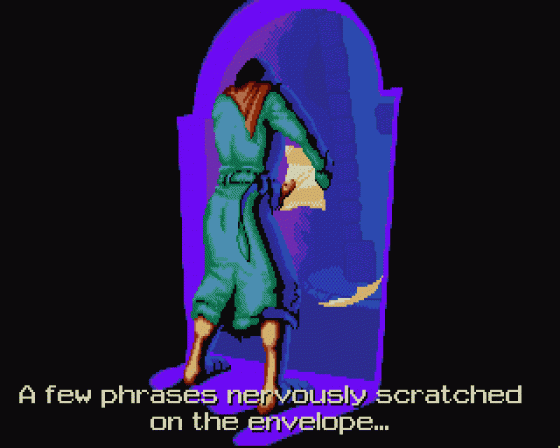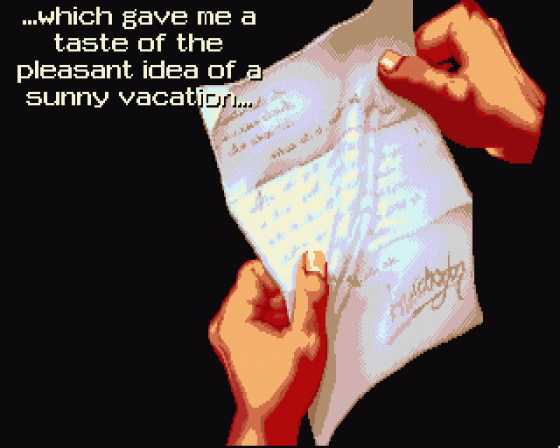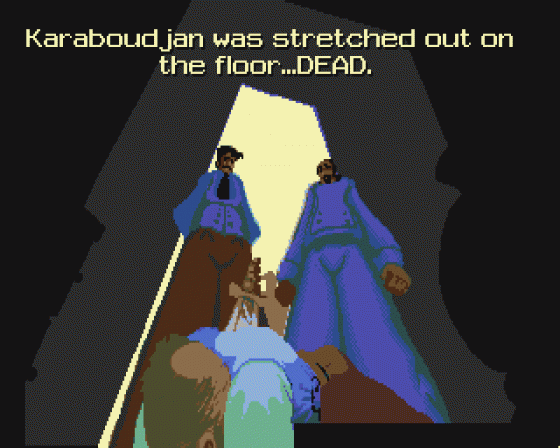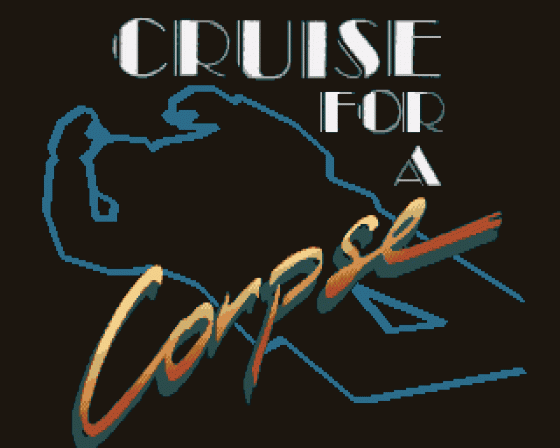
ST Format
 1st January 1992
1st January 1992
Categories: Review: Software
Author: Neil Jackson
Publisher: Delphine
Machine: Atari ST
Published in ST Format #29
'Ere's summzing to get your leetle grey cells working - murder, mystery and suspense - and zat's just ze protection system. Format's super sleuth, Neil Jackson, plays the fat Belgian detective at his own game...
Cruise For A Corpse
After the success of Delphine's earlier adventures, Future Wars and Operation Stealth, you'd expect Cruise For A Corpse to be pretty amazing too. It is fairly amazing - relying as it does on the same mouse-driven system which made its stable-mates so accessible and appealing. But that alone doesn't mean you're going to have a good adventure.
The game starts off with a complex-looking protection system. You are subjected to at least two tests using a circular dial-wheel with slots cut in to allow various pictures to show through. Often the process is a bit hit or miss because the quality of the colours on the dial-wheel is a bit naff.
Once you've made it into the game, you're presented with a hefty, plot-setting animation sequence which shows the events occurring prior to your involvement with the murder case. Ah yes, Cruise For A Corpse is a true-blue whodunnit, in the best (or should that be worst?) traditions of Agatha Christie.

The intro is outstanding in two ways. First, the standard of graphics is excellent, beating Delphine's previous best hands-down. Characters move gracefully around several beautifully drawn backgrounds with their speech over-printed in a clear white typeface. Gradually, you are drawn into the plot and become eager to get on with the business of being a detective.
Sadly, the other outstanding aspect of the intro - and indeed the rest of the game - is the music. Not good, at all. In fact, it's positively intolerably on the old-fashioned ST. Rarely has there been such a mismatched collection of squeaks and warbles purporting to be music. Embarrassed faces are the order of the day when less tolerant members of the household ask you politely, "Is that you making that awful noise?" A shame, because the music should be a subliminal atmosphere-enhancing aspect of the game. There is an option to send the music data to a MIDI keyboard, but you don't find any reference to it in the manual.
Soon, you end up on the deck of a boat, owned by a rich and powerful man who meets his maker before meeting you. And thus, the game's afoot. But before you can get stuck into the crime-busting lark, you are clubbed from behind by a shadowy figure and drop to the floor unconscious. Not off to a great start really, are you?

Once you come round - and the amazing double-vision effects have worn off - you can, at last, begin the adventure. Initially, this is an interesting task, carrying out the usual search and investigate operations common to Delphine and most other adventure games. There are oodles of things to click on, check out and come to conclusions about. Bookcases, skirting boards, boxes, bells, buttons and benches litter the entire ship, giving you ample room to get lost in the depths of trivia.
If you're lucky - or just a good detective - you occasionally come across a vital clue, which usually shouts, "I'm vital clue!" at you, just so you know you're on the right track. A small clock pops up and advances by a few minutes, letting you know that the plot has moved slowly, but inexorably, towards its final conclusion.
As you stroll around the ship's four levels and 31 locations, you're bound to meet one of the other passengers. Ah yes, the other part of being a crack Christie-type detective is the detailed questioning of all the suspects, culminating in the usual confrontation in the dining room. No surprises here - you must speak to each person individually and select a question (or several) from the list which appears.

You can ask people about themselves or others on the boat. You can dig for the dirt or delve for the details of certain "happenings". In practice, you just go through the whole list of questions until either the clock pops up again (telling you you've hit a nerve), you get new questions on your list, or you draw a blank. As time goes by, and leads get less and less, this process becomes monotonous because it involves little deductive thought, just logical, repetitive actions.
And almost all the time, that damned music is still wittering on in the background.
When you've run out of things to ask, you can be reasonably sure that it's an object you are missing. You can elect to walk through the whole ship, room by room, and search each screen until you find something you missed. This usually causes more frustration than it cures, because you're bound to come across loads of new items, only to be told. "I can't do that without the right tools," or "I can see nothing of interest." The initial messages regarding almost any object indicate that it may be of use or interest - but usually it's still a red herring. Once is fun, twice mildly amusing, but to do it all the time is a put-off.

A quicker way to get around the ship is to use the map screen which you access using the right mouse button. A flat plan view of the ship is presented, with an X marking your position. There's a small image of you which you can move to another room with a couple of clicks. This cuts out a lot of unnecessary journey time when you know exactly where you want to be.
Verdict
As a study in ST graphics and animation, Cruise For A Corpse is an exquisite piece of work. Clever animation techniques use a 3D polygon to represent your character - an effect which is surprisingly good. The background scenes are immensely detailed, and suitably reflect the artist's painstaking work.
But the two other key elements which make a game are gameplay and music. Sadly, neither of these factors is up to par in Cruise For A Corpse. The music has you reaching for the volume switch (unless you're a fan of 1920s pianola-style twiddlings) and the gameplay is not taxing for the right reasons. It should be a case of deduction, lateral thinking and calculated guesses paying off - not methodical, repetitive searches and interviews leading to... even more of the same. That's not any fun at all.
If you're after some brain-stretching entertainment, think twice about going for Cruise For A Corpse. It's as much fun as operating a graphical spreadsheet - and about as confusing. After about two hours of playing you're desperate for the hint book and looking for a way out. However, if the prospect of hours of pedantic clicking and re-clicking over the most beautiful screens you may ever see on your ST fills you with delight, then that's fine and good luck to you. But don't forget you were warned, okay?
In Brief
- Hard drive installable
- Gorgeous background screens and animation, on a par with the legendary Secret Of Monkey Island
- Appallingly bad music - it's even worse than what you get in Leisure Suit Larry!
- Gameplay is too repetitive and frustrating, and lacks the humour of earlier Delphine masterpieces Future Wars and Operation Stealth
Other Atari ST Game Reviews By Neil Jackson
Scores
Atari ST Version| Overall | 76% |
















